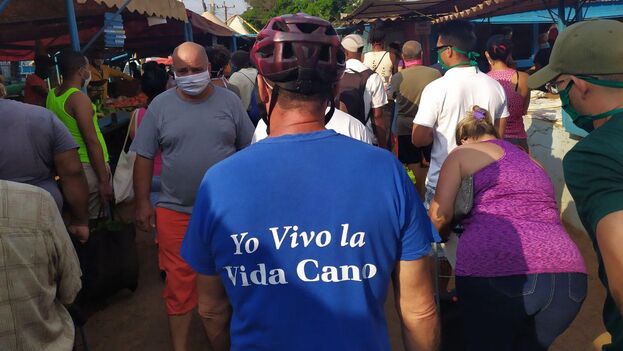
![]() 14ymedio, Yoani Sánchez, 15 April 2020 — I’ve been on WhatsApp for days with classmates from my time at the university. The pandemic has revitalized some friendships that, spread across various countries, help me to evoke school times, exchange family photos and project the future. Yesterday, another philologist — who also graduated in 2000 — asked me when I thought we could return to normal.
14ymedio, Yoani Sánchez, 15 April 2020 — I’ve been on WhatsApp for days with classmates from my time at the university. The pandemic has revitalized some friendships that, spread across various countries, help me to evoke school times, exchange family photos and project the future. Yesterday, another philologist — who also graduated in 2000 — asked me when I thought we could return to normal.
I did not know what to answer her. Normality is a concept that hardly fits in Cuba. How could we go back to a place we’ve never been? Is it possible to return to a moment that has not been lived? Could January be considered “normal,” a time when the word pandemic had not entered into our conversations and we did not even know the name of the disease that now torments us?
My friend laments that from her house in northern Germany, where she has been locked up for four weeks, she has seen the sun come out and the first signs of spring after a long winter, but the quarantine does not allow her to go outside to enjoy it. She hopes that the coronavirus will depart and she will be able to resume her routine. But in what “daily life” will we disembark in Cuba when the worst weeks pass?
The forecast does not seem very rosy. With the national economy bottoming out, this Covid-19, which has already claimed 24 lives on this Island, could lead us to experience unprecedented and extreme situations. I try to stay positive, but anxiety is in the air and I’ve already witnessed scenes that remind me of the worst moments of the 90s, with people fighting over a piece of chicken or stealing a bag containing all her purchases from an old woman.
Along with the worst, altruistic gestures also emerge. A little old lady in my building dropped her rationed eggs as soon as she bought them, and several neighbors donated part of theirs. The lady who feeds the abandoned animals that live in the neighborhood has not stopped going down even one day, to bring them something to eat. The octogenarian who lives on the corner calls me every afternoon to find out how I feel, although he is diabetic and has heart disease.
Close to home, next to the railway line that runs south, there are numerous families living in tin and cardboard shacks who, until recently, survived doing informal work, reselling coffee from the nearby roasting machine and collecting cans from the trash. They are “illegal” in Havana, as their identity cards do not contain a Havana address, and they have no ration book registered at a local bodega, much less an official salary from which they are now paid a part of while they stay at home. .
The pandemic has further exposed the fragility of these families. They, unlike my neighbor who dropped the eggs in front of the market, do not even have the right to buy that product because their names are registered only in a distant ration market in Guantánamo, Las Tunas or Santiago de Cuba. To make matters worse, the “box” with food frequently sent to them by their relatives no longer arrives because interprovincial transport has been cancelled.
For them, to return to “normality” is to return to rescuing empty soda or beer cans from the trash, being able knock on nearby doors selling some “good, original” coffee — as they would announce until recently– or being hired in jobs where they are paid less than a Havanan because they are not from here, because they are illegal in their own homeland.
My philologist friend who lives in Germany wants to return to the “normal” country where she lived until a few weeks ago, to go out to buy bread and to spend hours with her friends in a bar. My neighbors of the squatter encampment nearby only know shock and uncertainty as a common state, for them “normal” is not a safe place or a time of guarantees.
See other posts in this series.
_______________
COLLABORATE WITH OUR WORK: In this time of Covid-19 crisis, 14ymedio could really use your help to keep the news coming. Please click on this link to support our work.
